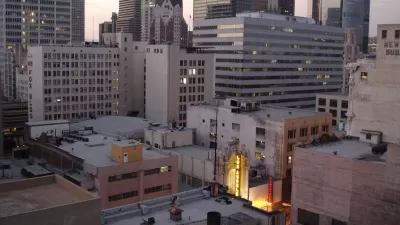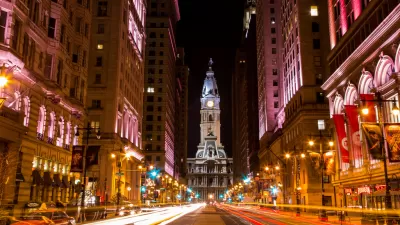The Pencoyd Landing development is focused on providing access to pedestrians, cyclists, and transit users in the neighborhood of Lower Merion Township, across the Schuylkill River from Philadelphia.

Pencoyd Iron Works, an abandoned industrial complex in Lower Merion, Pennsylvania, has been reimagined as Pencoyd Landing, "a modern waterfront complex that includes an elegant river walk, a tiny Victorian castle, a terrace restaurant and, improbably, a new Marriott hotel," writes Inga Saffron in the Philadelphia Inquirer. Despite its challenging location, "hemmed in by highways and high bluffs," developer Penn Group "has managed to use its difficult site to create a lush and cozy refuge from the world. Although not replicable everywhere, the results should inspire the region’s other waterfront projects to up their game."
Situated across the Schuylkill River from Philadelphia, the Pencoyd Landing site was acquired by Penn Group in 2000, "when it was still home to a rebar factory." Now, "[y]ou can meander along the river walk, stop for coffee or a meal at the Landing Kitchen (the latest offering from Philadelphia chef Nick Elmi), or admire the surviving ironworks structures."
One important feature of Pencoyd Landing is its connection to the adjacent trail and neighborhoods: "Most river sites are in floodplains, and developers don’t want to bother making provisions to deal with occasional high water. The result of that shortsighted approach can be seen along the Center City stretch of the Schuylkill, where a parade of garages is creating a wall between the river and the adjacent neighborhoods." Instead, "Pencoyd Landing was designed to be equally accessible to pedestrians, cyclists and transit riders." Donna Galvin, Penn Group co-founder, "decided it was worth taking her chances and keeping the new buildings as close to trail level as possible."
FULL STORY: Lower Merion suddenly has a walkable riverfront, thanks to Pencoyd Landing development

Planetizen Federal Action Tracker
A weekly monitor of how Trump’s orders and actions are impacting planners and planning in America.

Chicago’s Ghost Rails
Just beneath the surface of the modern city lie the remnants of its expansive early 20th-century streetcar system.

San Antonio and Austin are Fusing Into one Massive Megaregion
The region spanning the two central Texas cities is growing fast, posing challenges for local infrastructure and water supplies.

Since Zion's Shuttles Went Electric “The Smog is Gone”
Visitors to Zion National Park can enjoy the canyon via the nation’s first fully electric park shuttle system.

Trump Distributing DOT Safety Funds at 1/10 Rate of Biden
Funds for Safe Streets and other transportation safety and equity programs are being held up by administrative reviews and conflicts with the Trump administration’s priorities.

German Cities Subsidize Taxis for Women Amid Wave of Violence
Free or low-cost taxi rides can help women navigate cities more safely, but critics say the programs don't address the root causes of violence against women.
Urban Design for Planners 1: Software Tools
This six-course series explores essential urban design concepts using open source software and equips planners with the tools they need to participate fully in the urban design process.
Planning for Universal Design
Learn the tools for implementing Universal Design in planning regulations.
planning NEXT
Appalachian Highlands Housing Partners
Mpact (founded as Rail~Volution)
City of Camden Redevelopment Agency
City of Astoria
City of Portland
City of Laramie





























